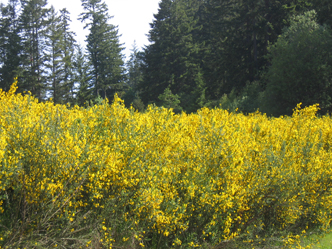Northern Arizona University’s Merriam-Powell Center for Environmental Research received a three-year, $720,000 grant from the National Science Foundation to examine the persistent effects of invasive Scotch broom on the survival and growth of Douglas fir trees, an economically important Pacific Northwest species.
Scotch broom, an invasive species native to Europe, proliferates rapidly after disturbances such as timber harvesting and creates dense stands that crowd out native plants, inhibit reforestation and negatively affect wildlife habitat. Scotch broom also leaves behind a complex legacy of soil chemistry changes that persist long after it is gone. These changes directly affect the survival and growth of Douglas fir.
“This project will examine how chemical changes resulting from Scotch-broom invasions influence beneficial soil organisms and soil-borne tree diseases, with the goal of understanding how long these changes persist and if they can be reversed,” said Karen Haubensak, the project’s principal investigator and assistant research professor in NAU’s Department of Biological Sciences.
This project, which will be conducted in cooperation with the University of California, Santa Cruz, has important implications for improving forestry practices in the Pacific Northwest. Scotch broom invasions in the region result in significant economic losses. According to the Oregon Department of Agriculture, Scotch broom costs the state an estimated $47 million dollars annually in lost timber production.
“This grant is one more example of the outstanding research taking place in the biological sciences at Northern Arizona University, particularly in the area of soil biome research,” said William Grabe, NAU’s vice president for Research. “Soil organisms and their interactions have important potential for not only restoring degraded systems, but also a host of other services such as carbon sequestration.”
This grant also makes possible outreach to public and private stakeholders to share findings that could result in improved resource management. Annual meetings will be organized to share information in a collaborative environment about effective strategies for combating the persistent effects of Scotch broom.
In addition to advancing research that can be applied to an important problem, this project will train and educate NAU students, including undergraduates, who will be involved in the field research.
Co-principal investigators on the grant are Ingrid Parker, University of California, Santa Cruz, Department of Ecology and Evolutionary Biology, and Catherine Gehring and Bruce Hungate, NAU, Department of Biological Sciences. The project is funded through the National Science Foundation’s Population and Community Ecology program in the Division of Environmental Biology.



